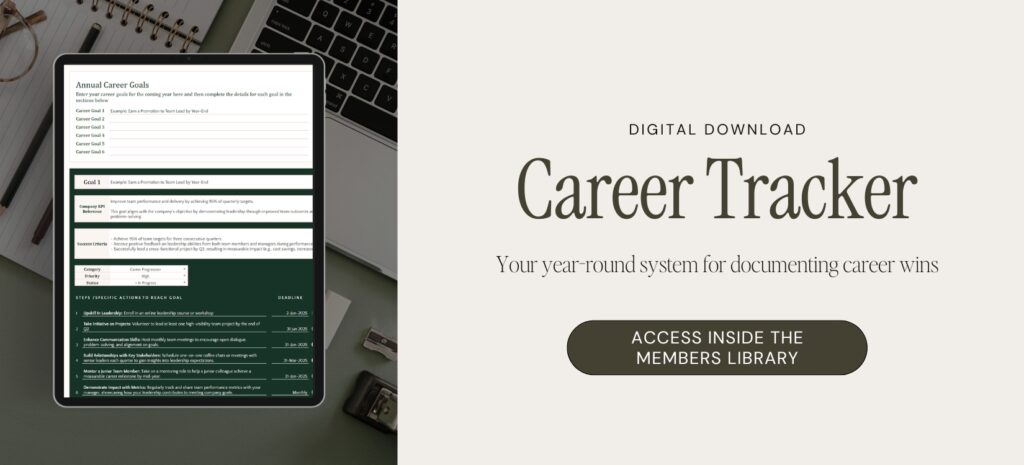When December rolls around and it’s time for your year-end review, most people scramble. They try to remember what they accomplished in January. They dig through old emails looking for proof of impact. And maybe they give themselves a little kick for not having saved everything in a document somewhere that they can easily reach for when the year-end review write-up time rolls around.
But there’s another group of women who walk into those conversations calm, confident, and armed with a clear record of everything they’ve achieved through the year. They don’t just hope their manager remembers their contributions – they make sure that they have clear accomplishments with measurable outcomes and business impact that allows them to show how they have contributed and why they are ready for the pay rise, promotion, or extra responsibilities that they are aiming to get.
The secret? They’ve been tracking their wins all year long.
It sounds simple (and it is), but it’s also going to make the year-end review much easier to prepare for and have more impact.
Here’s why tracking your accomplishments matters, how to do it effectively, and how it sets you up not just for year-end reviews, but for promotions, raises, and new opportunities.
Why Most People Fail at Year-End Reviews
Picture this: You’ve been working hard all year. You’ve exceeded expectations, solved problems, and gone above and beyond. But when it comes time to advocate for yourself in your review, you draw a blank.
You remember the big project from last month, but what about the client win in March? The process improvement you implemented in June? The junior team member you mentored throughout the year? It all blurs together, and inevitably you will walk out of the review and think, “Oh no, I meant to mention this thing that I did.”
Meanwhile, your manager is thinking about dozens of employees and hundreds of projects. Unless you’ve made your impact impossible to forget, there’s a good chance they’re not remembering everything you’ve done either.
This is the trap that keeps high-performing women from getting the recognition they deserve. It’s not that you haven’t done great work – it’s that you haven’t documented it.

The Promotion-Worthy Habit: Track Your Wins in Real Time
The habit that you need to adopt now and take into next year is that you mustn’t wait until December to think about your accomplishments. You should be tracking these as they happen.
This doesn’t mean spending hours on documentation. It means creating a simple system where you capture your wins in the moment, so when it’s time to make your case for a promotion, you have everything you need at your fingertips.
Here’s what tracking your wins gives you:
- Confidence during reviews: Instead of hoping your manager remembers your contributions, you walk in with a clear, compelling narrative about your impact.
- Ammunition for promotion conversations: When a new role opens up, you’re not starting from scratch. You have a record of proof that shows you’re ready that you can quickly reach for.
- Clarity on your own growth: Looking back at your wins helps you see patterns in what you’re good at, what energizes you, and where you’ve made the biggest impact.
- Stronger salary negotiations: Numbers matter. When you can say, “I increased efficiency by 30%,” or “I brought in £X in new revenue,” you’re justifying why you should get the raise or the promotion.
- Protection against bias: Unfortunately, women’s contributions are often overlooked or attributed to someone else. Having a documented record protects you.
How to Start Tracking Your Accomplishments Today
You don’t need a fancy system, you just need something you’ll actually use and stick with throughout the year. Here are a few approaches that work:
Option 1: The Weekly Brain Dump
Every Friday afternoon (or Monday morning), spend 10 minutes writing down everything you accomplished that week. Include:
- Projects completed or milestones hit
- Problems you solved
- Positive feedback you received
- Meetings where your input made a difference
- Skills you developed or improved
- People you helped or mentored
- Revenue you generated or saved for the business
Keep it in a simple Word document, notes app, or journal. The key here is to make it easy to maintain the habit in a way that works best for you.
Option 2: The Wins Folder
Create a folder in your email called “Wins” (or “Accomplishments,” or whatever feels right). Every time you receive positive feedback, complete a project, or hit a goal, forward the email to that folder or take a screenshot.
At the end of each month, review the folder and summarize what you’ve achieved. This method works especially well if you’re someone who thrives on visual proof.
Option 3: The Peer Suite Career Tracker
If you’re a Peer Suite member, you already have access to a Career Tracking Sheet in the members library. This template is designed specifically to help you document:
- Quarterly wins and achievements
- Skills developed
- Feedback received
- Projects led or contributed to
- Career goals and progress toward them
It’s structured, easy to update, and designed to align with year-end review formats so you’re always prepared.
Not a member yet? You can access the Career Tracking Sheet and our full library of resources by joining Peer Suite here.

Option 4: The Monthly Check-In
Set a recurring calendar reminder on the last day of every month: “Update wins tracker.” Spend 15 minutes reviewing your calendar, emails, and notes to capture what you accomplished.
Be specific. Instead of “worked on marketing campaign,” write “led Q3 marketing campaign that increased lead generation by 25%.”
What to Track (and What Actually Counts as a Win)
If you’re thinking, “But I don’t have any big wins to track,” you’re not thinking broadly enough. A “win” isn’t just landing a major client or launching a company-wide initiative. It’s anything that moved the needle forward. Here are examples:
Quantifiable Results
- Increased revenue, efficiency, or productivity by X%
- Reduced costs, errors, or turnaround time
- Hit or exceeded targets (sales, KPIs, project deadlines)
Problem-Solving
- Identified and fixed a process issue
- Resolved a client or team conflict
- Found a creative solution to a roadblock
Leadership and Collaboration
- Mentored a junior colleague
- Led or contributed to a cross-functional project
- Facilitated a productive meeting or brainstorm
Skill Development
- Completed a course, certification, or training
- Learned a new tool, system, or skill
- Improved at something you struggled with before
Recognition
- Received positive feedback from a manager, client, or colleague
- Was asked to present at a meeting or lead an initiative
- Was recommended or referred by someone
The key is to think beyond “big wins” and capture the everyday contributions that demonstrate your value.

How to Use Your Wins Tracker to Get Promoted
Tracking your wins allows you to position yourself strategically for career advancement. Here’s how to use your tracker:
1. During Performance Reviews
Go into your review with a one-page summary of your top accomplishments. Structure it around:
- Key results and impact (with numbers when possible)
- How your work aligned with company goals
- Skills you developed or challenges you overcame
- What you’re excited to take on next
Don’t think of this as bragging – instead, think of this as presenting facts that can help your manager advocate for you.
Pro tip: Peer Suite members can access a full video session on preparing for year-end reviews in the members library. It walks through how to structure your accomplishments, respond to tough questions, and negotiate effectively. Log in to watch here.

2. When Asking for a Raise or Promotion
Timing matters, but so does having the evidence to support your case. When you ask for a promotion, your manager needs to justify it to their higher-ups. Make it easy for them by providing:
- A clear narrative of your growth and impact
- Examples of you already operating at the next level
- Specific contributions that benefited the team or company
Your wins tracker becomes the foundation of that case.
A little tip: aim to have this conversation with your manager ahead of the year-end review. Depending on the company or organisation you work for, your manager is already thinking about your promotion or pay rise as early as August. They often need to bring their proposals to more senior leadership for approval. So the earlier you begin telling your manager what you want in terms of a promotion, the better. And if you can keep them abreast of your accomplishments throughout the year, this will better enable them to advocate for you.
3. When Applying for Internal Roles
Most applications ask for examples of your accomplishments or how you’ve demonstrated certain skills. If you’ve been tracking your wins, you can pull relevant examples in minutes instead of scrambling to remember.
4. When Updating Your CV or LinkedIn
Your wins tracker is a goldmine for keeping your CV current. Instead of trying to remember what you did two years ago, you have a running record of achievements you can pull from.
5. When Networking or Interviewing
Being able to speak confidently about your impact – with specifics – makes you more memorable. Your wins tracker ensures you always have compelling stories ready to share.

The Mindset Shift: From Humble to Strategic
Many women struggle with self-promotion. We’re taught that good work should speak for itself, and that talking about our accomplishments feels like bragging.
But oftentimes your work doesn’t speak for itself – not because you’re not doing great work or having an impact, but because everyone is busy and when it comes to end-of-year reviews and opportunities throughout the year to get involved in projects or be up for a mid-year promotion, some of those great things may have been forgotten. You have to speak for your work and advocate for yourself.
Tracking your wins makes sure you’re not overlooked when promotions are decided.
For more on how to master your mindset, discover 20 mindset books every woman should read here.
Start Today: Your 5-Minute Action Plan
You don’t need to overhaul your entire system or track every single thing you’ve ever done. Just start small:
- Right now, open a note or document and write down three things you’ve accomplished in the past month.
- Set a reminder for the end of this week to capture your weekly wins.
- Choose your method – weekly brain dump, wins folder, monthly check-in, or use the Peer Suite Career Tracker.
- Make it a habit by linking it to something you already do (like your Friday wrap-up routine or Monday morning reset).
That’s it – you don’t need perfection, you just need consistency.

Final Thoughts
Working hard is obviously important to getting a promotion, but making sure the right people know about your impact, at the right time, with the right evidence is going to help make those conversations and decisions much easier.
Tracking your accomplishments is the simplest, most powerful way to position yourself for career advancement. It takes less than 10 minutes a week, but it’s the difference between hoping you get recognized and ensuring you do.
So start tracking your wins today – and walk into your next review, promotion conversation, or job interview with the confidence that comes from knowing exactly what you’ve achieved.
Ready to take your career to the next level? Join Peer Suite for access to the Career Tracking Sheet, the Year-End Review Prep video session, and a supportive community of professional women navigating the same challenges. Learn more about membership here.
13
Oct
